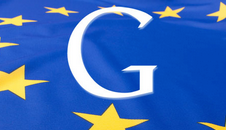Dear Google Rivals: Do These New Proposals Solve Your Antitrust Concerns? Love, The EU
Three years into its investigation of Google over antitrust issues relating to search, the European Union took another step closer toward a likely resolution, asking Google rivals and other third-parties to review a settlement proposal. Notably, the general public wasn’t invited to participate. The news comes via several reports today. The European Union’s Competition agency posted […]
 Three years into its investigation of Google over antitrust issues relating to search, the European Union took another step closer toward a likely resolution, asking Google rivals and other third-parties to review a settlement proposal. Notably, the general public wasn’t invited to participate.
Three years into its investigation of Google over antitrust issues relating to search, the European Union took another step closer toward a likely resolution, asking Google rivals and other third-parties to review a settlement proposal. Notably, the general public wasn’t invited to participate.
The news comes via several reports today. The European Union’s Competition agency posted nothing on its website, though the move follows on what it promised to do earlier this month.
The Wall Street Journal and Reuters say that 125 companies have been asked to comment on the latest proposal, including all those who commented on the last one. The proposal would show three sets of results from rival search engines under Google’s own “specialized” or “vertical” search results, with rivals bidding against each other for placement.
In the latest revision, the minimum bid price has been reduced to three EU cents, from 10 EU cents. Companies would also have the right to opt-out of inclusion in individual Google search services. They could be in Google’s main search engine, for example, but stay out of Google Images.
The Register notes that the EU has decided feedback on the proposals from rivals is important but not from the general public. Rivals given a look at the proposal are forbidden from discussing it. The public isn’t invited to review the proposal.
That’s in stark contrast to the US Federal Trade Commission, which concluded its investigation earlier this year and noted that the goal was to protect competition, not competitors. While competitors lobbied for the investigation itself, and proposed changes all during the process, the FTC seemed to conclude that any changes should be made to benefit consumers, not competitors.
The EU, with this latest round of reviews focused on asking for competition feedback, gives the appearance that it is more concerned about protecting competitors rather that competition or consumers themselves.
Companies have four weeks to respond. Then, presumably, the EU might make a final decision on wrapping up its investigation that started in November 2010. If not, potentially the investigation could continue on into 2014.
More background on the investigation can be found below:
- EU Goes Public With Google Antitrust Proposals, “Market Test” FAQs, April 25, 2103
- Google’s New European “Antitrust” Search Results: Here’s What They’ll Look Like, April 25, 2013
- New Concessions From Google Seek To Avoid EU Antitrust Penalties, Sept. 9, 2013
- New Google Antitrust Offer A “Significant Improvement” Says EU, Oct. 1, 2013
Contributing authors are invited to create content for Search Engine Land and are chosen for their expertise and contribution to the search community. Our contributors work under the oversight of the editorial staff and contributions are checked for quality and relevance to our readers. The opinions they express are their own.
Related stories